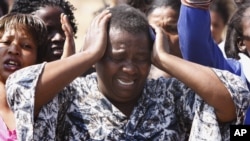A human rights group is calling on the South African government to broaden its investigation into the police killings of protesting miners. Thirty-four mineworkers were shot dead August 16 at the Lonmin Platinum Mine in Marikana.
Human Rights Watch says the Commission of Inquiry must be independent, impartial and consider the underlying causes of the violence. President Zuma announced he would set up the panel the day after the killings.
South African law requires that police use-of-force be reasonable and necessary – and the use of deadly force must be based on a serious threat of violence to police or others.
Human Rights Watch South Africa Director Cameron Jacobs said the investigation should begin quickly.
“We want to ensure that political games are not being played, that there is actual seriousness about the Commission of Inquiry. That’s the first instance. And one of the most important things therefore in terms of establishing the Commission of Inquiry is to ensure that it is a judicial commission of inquiry, as opposed just to anybody presiding over the commission of inquiry,” he said.
He said the panel should look at what he calls “the broad gamut of issues” that led to the mineworkers’ deaths, and not be limited to the lethal force used by police.
“I think that one must also remember that 10 people prior to August the 16th were killed in the violence and ensuing strike action,” he said.
That violence is blamed in part on a dispute between rival mineworker unions. But Jacobs proposes the investigation also include social conditions in the country.
“I think equally concerning in the country is the high level of poverty, inequality and deprivation. The past five years in South Africa in particular, with a range of different protests around the non-delivery of services, or when it comes to striking workers wanting better wages and better conditions in employment - South Africa has seen over the past couple of years that these kinds of protests have become increasingly violent,” he said.
A parallel investigation into the August 16th violence will be conducted by the independent Police Investigative Directorate. Human rights Watch recommended steps be taken so the two probes complement each other and not simply compete. Although the Commission of inquiry has been announced, it’s unclear who will be appointed as members or when its work will begin.
Human Rights Watch says the Commission of Inquiry must be independent, impartial and consider the underlying causes of the violence. President Zuma announced he would set up the panel the day after the killings.
South African law requires that police use-of-force be reasonable and necessary – and the use of deadly force must be based on a serious threat of violence to police or others.
Human Rights Watch South Africa Director Cameron Jacobs said the investigation should begin quickly.
“We want to ensure that political games are not being played, that there is actual seriousness about the Commission of Inquiry. That’s the first instance. And one of the most important things therefore in terms of establishing the Commission of Inquiry is to ensure that it is a judicial commission of inquiry, as opposed just to anybody presiding over the commission of inquiry,” he said.
He said the panel should look at what he calls “the broad gamut of issues” that led to the mineworkers’ deaths, and not be limited to the lethal force used by police.
“I think that one must also remember that 10 people prior to August the 16th were killed in the violence and ensuing strike action,” he said.
That violence is blamed in part on a dispute between rival mineworker unions. But Jacobs proposes the investigation also include social conditions in the country.
“I think equally concerning in the country is the high level of poverty, inequality and deprivation. The past five years in South Africa in particular, with a range of different protests around the non-delivery of services, or when it comes to striking workers wanting better wages and better conditions in employment - South Africa has seen over the past couple of years that these kinds of protests have become increasingly violent,” he said.
A parallel investigation into the August 16th violence will be conducted by the independent Police Investigative Directorate. Human rights Watch recommended steps be taken so the two probes complement each other and not simply compete. Although the Commission of inquiry has been announced, it’s unclear who will be appointed as members or when its work will begin.




